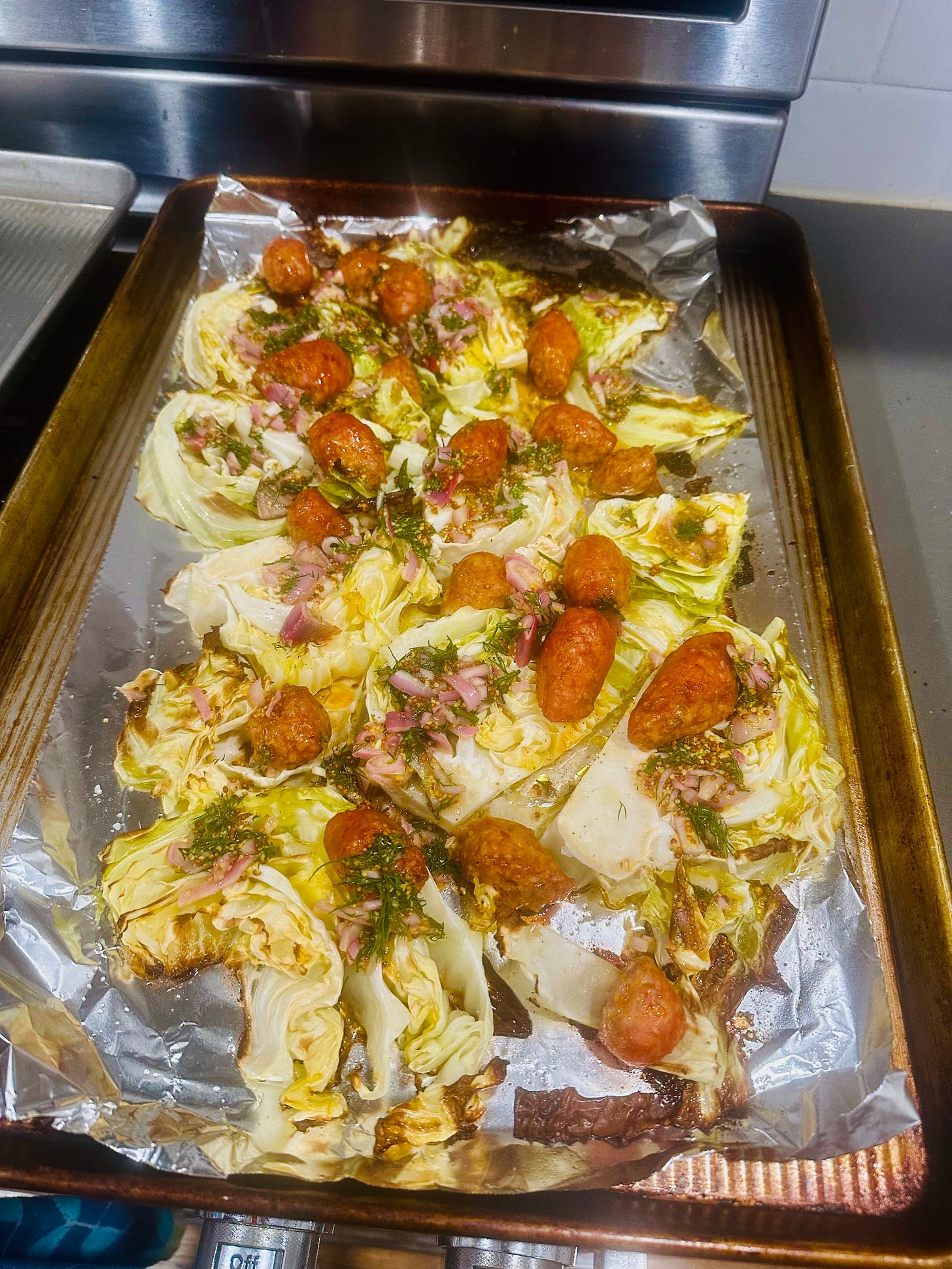The Biggest Reason Americans Eat Fast Food
'Super Size Me' at 20, plus Maxwell and adventures in cabbage
Dear Friends,
It was an honor (and also felt sorta backhanded!) to get texts of shock and surprise after I recently sent out two newsletters over the course of a few days.
Look, The Crunchwrap Life isn’t easy. But I am not above promising BIG THINGS going forward: Recurring features, short essays, warm takes, and other stuff that is too sloppy and haphazardly executed bold for mainstream publications.
Here comes one now. ⬇️
First Crunch
As many people were already mentally zoning out for the long weekend, news of filmmaker Morgan Spurlock’s death made the rounds. He died of cancer at a tragically young age of 53 and almost exactly 20 years after hit documentary “Super Size Me” became a cultural sensation. The film infamously followed Spurlock as he ate nothing but McDonald’s for a month and (ostensibly) suffered the physical anguish of this terrible diet with limited exercise. Made on a $65,000 budget, “Super Size Me” grossed $22 million at box offices and also grossed millions of people out. It even got an Oscar nod.
Time was not particularly kind to the film’s reputation. Of its many copycats, one Swedish university replicated his experiment using medical students and found no health outcomes anywhere near as drastic or deleterious as the ones claimed by Spurlock. Later preempting some #MeToo allegations with a confessional op-ed in 2018, Spurlock admitted to being an alcoholic for his entire adult life; this disclosure would cast further doubt upon the soundness of his McDonald’s experiment and (perhaps) clarify a moment in the doc when a doctor warns him on screen that his liver resembled “an alcoholic’s after a binge.”
In general, criticisms of the industry or its nutrition or its portioning tend to overlook a huge reason why fast food has been so successful and why many consumers rely on it: America’s working culture makes it exceedingly difficult for people to plan and shop for a meal, much less cook or clean up after one.
The Spurlock story is sad and I’m not here to pile on so much as point to something that I think still gets lost in the ongoing conversation that “Super Size Me” helped instigate: Why many Americans eat fast food in the first place.
In general, criticisms of the industry or its nutritional shortcomings or its portioning tend to overlook a huge reason why fast food has been so successful and why many consumers rely on it: America’s working culture makes it exceedingly difficult for people to plan and shop for a meal, much less cook or clean up after one. I talked a bit about the weight of this time crunch specifically (as it relates to fast food) in my last book, Drive-Thru Dreams. And I talk A LOT about this more expansively (as it relates to American life) in my next book, 99% Perspiration.
Most public-intellectual types in the food space seem to understand the problem here. Years ago, I spoke with Michael Pollan when he was promoting his Netflix docu-series “Cooked” about the lost joys of cooking. “Time is the big impediment to most people…” he told me. “People have less time and even people who have the same amount of time feel like they have less time. We work long hours, some of us work two jobs, and we have longer commute times.”
Unfortunately, his project was about the sexiness of cooking, not the physical and psychic tonnage of hustle culture or the lack of time off or sick leave or childcare infrastructure in America. As a result, the solutions he shared with me dumped responsibility on the individual. People, he suggested, could find more time somewhere, somehow….by conducting personal time audits or by not wasting so many hours futzing on the internet. To be clear, Michael Pollan is a genius and deeply empathetic person. But the problem is much harder to solve for than we’d like to admit.
***
Here’s the rub: More than the taste of a Big Mac and more than even the price of one, consumer surveys and industry research regularly show that speed of service is the top reason why diners choose fast food. For some, the convenience of McDonald’s is the snap solution for not having easy access to groceries or not having the answer to the question What’s for dinner? In too many cases, the specter of having children reject what a parent cooks for them is either too expensive or too deflating to abide. Across all demographic lines and income levels, people in drive-thru lines across America are quite literally not thinking about future costs of eating fast food because they are just trying to get through their days. These factors speak to deeper, more endemic American problems, problems that have little to do with what observers typically crusade about in discussions of health or consumer habits.
The truth is that thanks to the goading of the Spurlocks and Schlossers and Pollens, we now understand the basic cosmology of how McDonald’s and its ilk have generally become bad – from labor to health to the environment. AND YET, despite all of this knowledge, the fast food industry is bigger and more popular than it’s ever been. And not because McDonald’s or Burger King have drastically overhauled their labor practices or introduced salads or plant-based burgers – those items have typically failed or are currently failing. It’s because the experience remains convenient and predictable and FAST.
For a stressed-out country and overworked consumer base, that’s still what matters most.
Quick Breather
It took me about 30 seconds to figure out how to unmute this, but after I did, I loved this and watched it three times.
NYT Cooking Comment Watch
As a native Houstonian, I have a lot of sympathy for what Houston households battle – extreme weather and humidity, streaky baseball, and the travails of a blue city in a red state. And that sentiment now extends beyond geographic bounds to NY Times commenter “Mike Houston.” Houston recently made Ali Slagle’s delicious “Sheet Pan Kielbasa With Cabbage and Beans” and was met with nothing but contempt.
Poor Mike! I have no idea why he decided to share this with the world or if he followed the instructions, but in his family’s defense, the visual of this dish are tough. One of the lesser appreciated challenges of cabbage is that it’s actually impossible to make look appetizing once cooked (see below). That said, the combo of dill, red wine vinegar, and Dijon here is very gratifying. I opted against adding beans and substituted Premio hot sausages for the kielbasa. Big fan!
Nu, What Else?
It was recently Maxwell’s birthday. I’m talking about the singer/songwriter but unless you’re older than 35 and younger than 45, you’re probably just nodding politely. That said, you don’t have to know Maxwell to enjoy this extremely charming podcast episode about the rise and fall of the ringtone industrial complex in which the Maxwell song “Women’s Work” plays a central part. This is *guaranteed* to improve your day. – 99% Invisible
I’m a big fan of
’s work going back to when she covered the food business beat for The Washington Post. In a recent newsletter, she explored the online furniture ecosystem and how popular retailers sell the exact same items under different names with wildly varying prices. (I honestly never thought to do a Google image search of my online purchases, but maybe now I will!) – Links I Would GChat YouI found this Memorial Day photo-essay (gift article) about the aftermath of the death of Sgt. Kennedy Sanders deeply moving. - NY Times
As you may have noticed, I am somehow still out here yakking about the cultural and social trends that led to the birth of fast food in America. Last week, LAist asked me to talk about how Southern California became the birthplace of so many iconic chains. – LAist
That’s it for this week’s Crunchwrap! Thank you as always for reading, sharing, and writing in.
With love,
Adam










Thank you for linking to my furniture piece!! Happy to have found your newsletter. Now I'm craving a Crunchwrap, though ... 😬😬